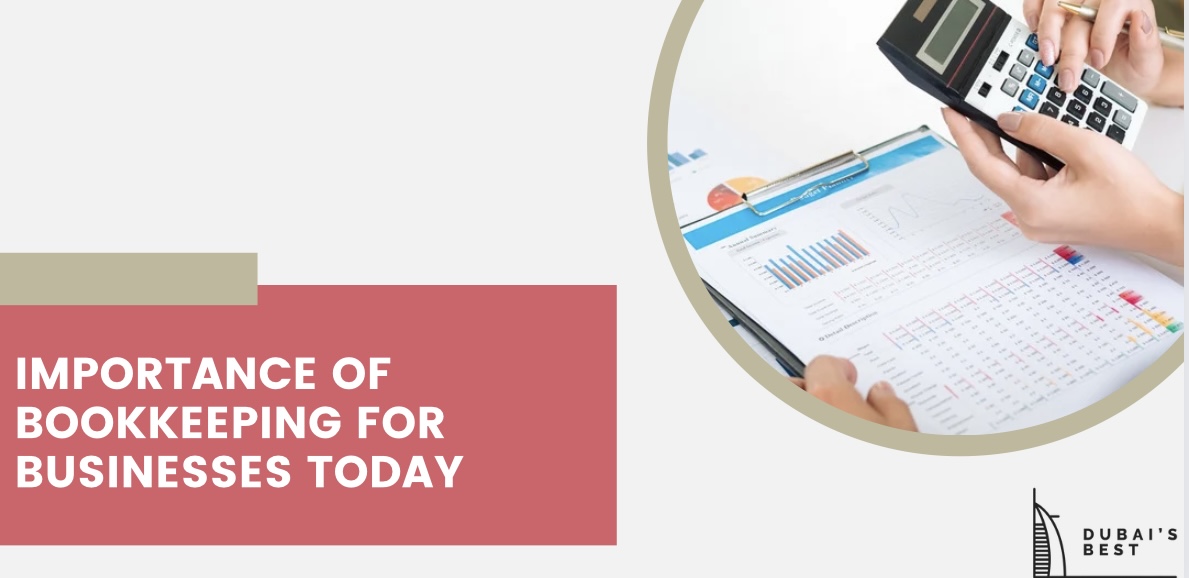The Importance of Bookkeeping for Businesses Today
Bookkeeping is the process of keeping records of financial transactions and other events in a business.
It is a critical component of running a business since it enables you to track your revenue and expenses, ensure that you pay your taxes on time, and prepare reports for lenders and investors.
In the following, we discuss the importance of bookkeeping for your business.
1. Records Organization
Organizing your financial records as you go along is the best way to minimize the time and effort you’ll need to spend on this task.
If a client asks for information about a transaction, don’t start sifting through old files. Organize your bookkeeping so that records are easy to access and find.
Having separate bank accounts for business and personal finances will also help keep things organized.
It’s harder to stay on top of payments, credit scores, income, and expenses if they’re all mixed together, which might lead you (or your accountant) to miss some important deductions at tax time or lose track of when a payment was received.
When it comes time to organize your records, separate them into categories and label them by type and date. You can use physical folders or an electronic filing system such as Google Drive or DropBox to store documents like receipts and bills.
If you have paper copies of important documents like purchase agreements or contracts, scan them so that they’re backed up online as well as stored physically in case something happens to one set of documents (theft or fire).
Thus, you should make an effort every day or week to enter data into your accounting software program so that everything is accurate and up-to-date at any point during the year.
2. Decision-Making
Bookkeeping will allow you to make better business decisions. In order to make the right decisions, you need accurate and complete information.
A solid history of your financials will help you make well-informed choices about how to proceed. Bookkeeping allows you to look at previous years’ data in order to decide whether this is the time for an expansion or if it’s time to stay put for a while (and save funds).
It can also help with determining prices. If your costs are too high, pricing is going up, or profits are down, bookkeeping might be able to give you clues as to why this is happening and whether something needs to be adjusted.
3. Creation of Accurate Financial Records
Accurate financial records are a must for any small business, but few people realize how important they can be. You might think of your business’s books as private accounting, and that’s fine.
What happens internally is not necessarily the government’s business. But when it comes to loans and investors, you will need to produce accurate records on demand.
If these documents aren’t maintained correctly and systematically, you could end up losing money from fines or penalties assessed by the government, your creditors or lenders—or even your own investors.
Your company may also require you to maintain accurate financial records in order to secure financing for future expansion goals.
Being able to produce clear documents with all of the appropriate data at a moment’s notice can make or break your ability to obtain capital when it matters most: during times of growth or transition. No one wants their dreams quashed by a clerical error!
4. Tax Filing
So why is bookkeeping important? When you keep good records, you’ll have the data needed to make smart decisions about your business.
As the old saying goes, “You can’t manage what you don’t measure.” Good records also help ensure that your business stays in compliance with government regulations and tax laws—a must for every business owner.
Bookkeeping helps you stay organized, on top of your cash flow, and prepare for tax time. With small business bookkeeping software like QuickBooks Online, it’s easier than ever to track expenses and generate reports for everything from profit and loss to quarterly taxes.
5. Budgeting
When you are a small business, it is essential to know how much money you have coming in, and how much money you have going out. It is also good to have a record of this.
With bookkeeping, you can manage your budget, and make sure that your company does not overspend or underspend.
You’ll be able to identify areas of your business where there are problems with spending too much or too little. This may give you an idea of what improvements you can make for cost reduction and profit increase.
6. Gaining Investors
If you want to get investors involved, they’re going to need to see that you know what’s going on. You won’t be able to convince investors that your business is a good opportunity if you don’t understand your finances or if you are lacking organization in them.
Showing a detailed picture of how much money the company has spent and how much it has earned will allow the investor to understand what kind of business they are investing in. Without bookkeeping services, it’s almost impossible for an investor to invest in your company.
By showing them detailed records of each transaction and financial statement, an investor will be able to see if it’s worth their time or not.
Good bookkeeping can help you prove that you know what you’re doing with the money being put into your business, allowing investors to trust that their investment was worth it because there is complete transparency over everything being done within the company.
In order to expand your business, pay attention to your bookkeeping. The finances of a business can be the most overwhelming part to deal with, which is why hiring an accountant or bookkeeper is best.
This will significantly help you as a business owner, whether for gaining investors or organizing records.
More Business Resources:
Best Business Consulting Firms in Dubai
Firms for the Best Employment Lawyers in Dubai

